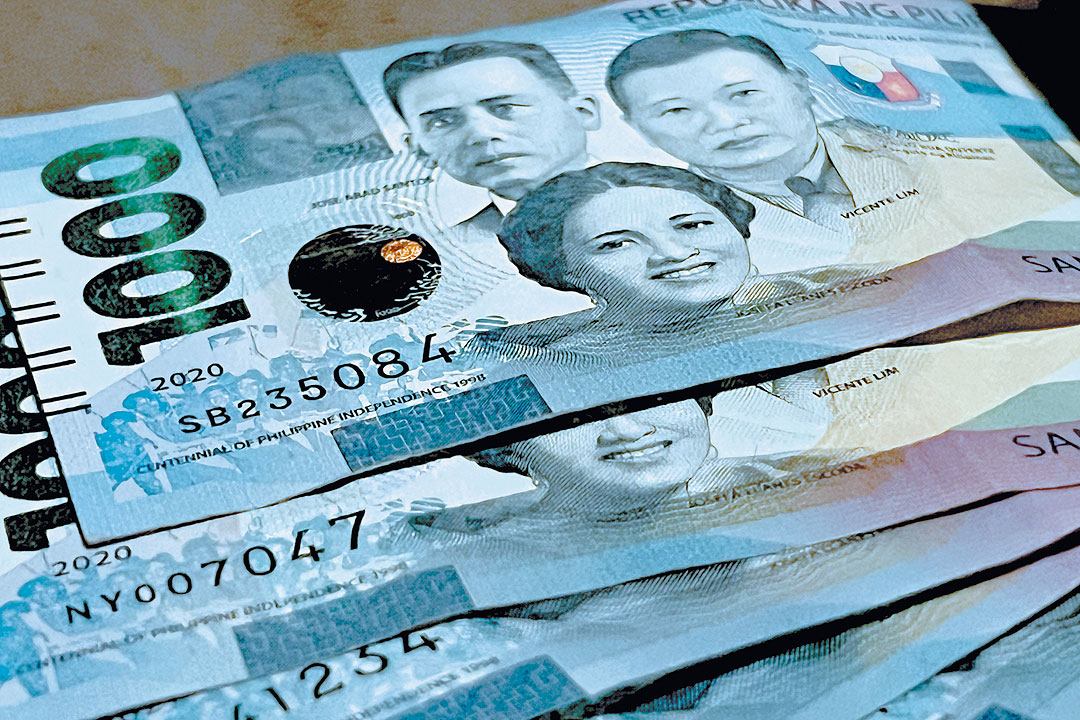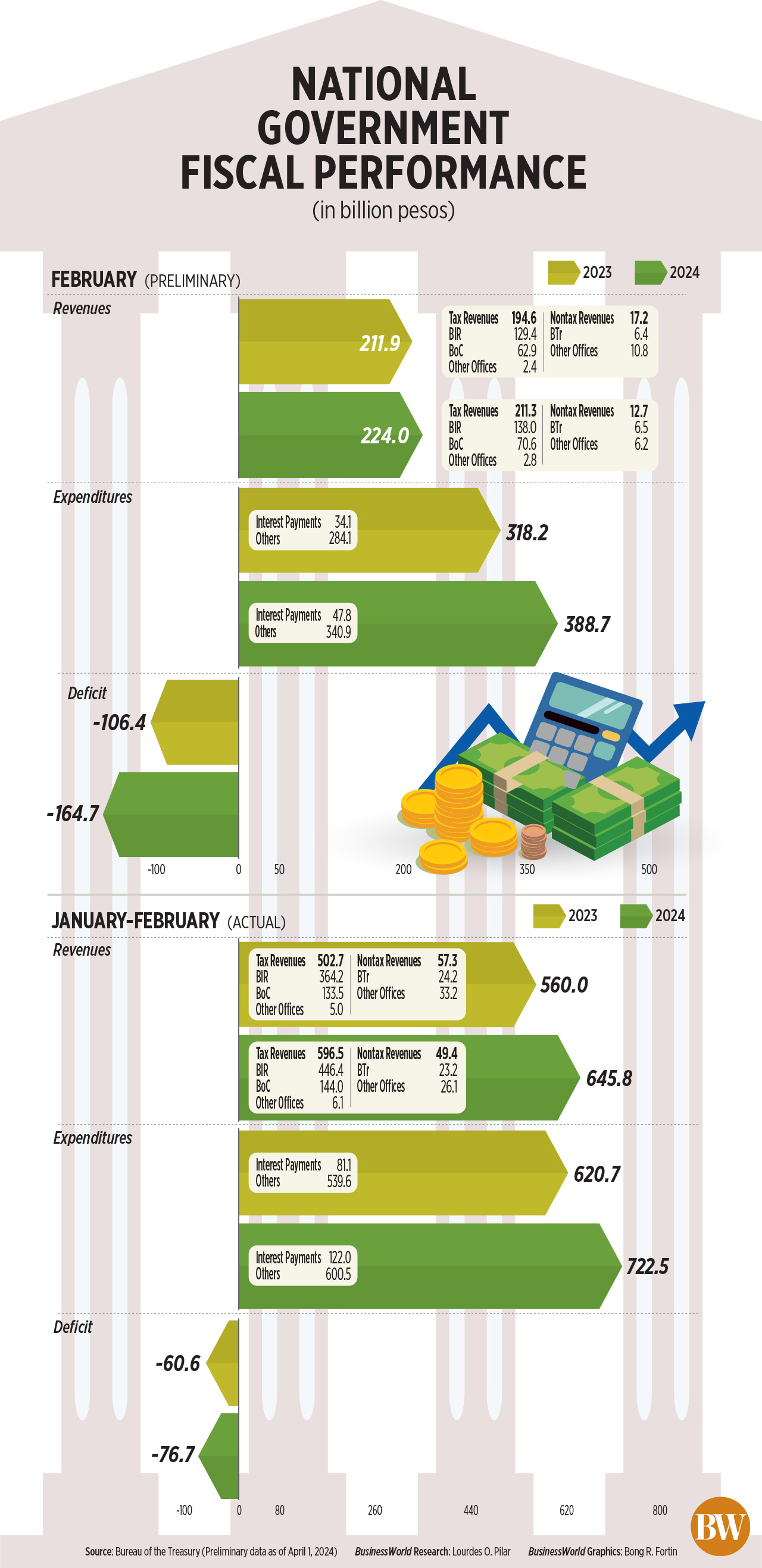February budget gap widens

THE NATIONAL GOVERNMENT’S (NG) budget deficit ballooned in February amid double-digit growth in state spending, the Bureau of the Treasury (BTr) reported on Monday.
Data from the BTr showed that the fiscal gap widened by 54.81% to P164.7 billion from P106.4 billion a year earlier.
Month on month, the budget balance swung back to a deficit from the P88-billion surplus in January.
 “The wider budget gap stemmed from the 22.14% year-over-year increase in expenditures, matched with moderate revenue growth of 5.73%,” the BTr said in a press release.
“The wider budget gap stemmed from the 22.14% year-over-year increase in expenditures, matched with moderate revenue growth of 5.73%,” the BTr said in a press release.
In February, government expenditures surged by 22.14% to P388.7 billion from P318.2 billion a year ago.
The BTr said expenditure growth was driven by “higher releases to local government units, as well as larger disbursements recorded in the Department of Health and Department of Social Welfare and Development for their banner health and social protection programs, respectively.”
“Similarly, higher capital expenditures posted by the Department of Public Works and Highways contributed to the growth of February 2024 disbursements,” it added.
Interest payments jumped by 40.22% to P47.8 billion in February from P34.1 billion a year ago.
Primary spending, which refers to total expenditures minus interest payments, climbed by 19.97% to P340.9 billion from P284.1 billion a year ago.
Meanwhile, revenues rose by 5.73% to P224 billion from P211.9 billion a year earlier.
Tax revenues went up by 8.56% year on year to P211.3 billion, as Bureau of Internal Revenue (BIR) collections increased by 6.65% to P138 billion and Bureau of Customs (BoC) revenues climbed by 12.19% to P70.6 billion.
On the other hand, nontax revenues declined by 26.21% to P12.7 billion in February. Revenues from other offices plunged by 42.62% to P6.2 billion due to “lower Malampaya proceeds.”
During the month, BTr income inched up by 1.56% to P6.5 billion due to higher dividend remittances and the NG’s share from Philippine Amusement and Gaming Corp. income.
Ruben Carlo O. Asuncion, chief economist at Union Bank of the Philippines, Inc., said the jump in state spending in February was expected.
“It’s the start of the year and understandably the NG would like to get spending going via local government units, health and social services and the flagship infrastructure development,” he said in a Viber message.
“Note that interest payments also were up 40% year on year, and this is also within our expectation of NG’s push for fiscal consolidation and debt payments,” he added.
Rizal Commercial Banking Corp. Chief Economist Michael L. Ricafort noted that high inflation and elevated interest rates had driven up expenditures.
Inflation accelerated for the first time in five months to 3.4% in February.
The Bangko Sentral ng Pilipinas (BSP) kept its benchmark rate steady for a third straight meeting at a near 17-year high of 6.5% in February.
TWO-MONTH DEFICIT
In the first two months of 2024, the budget deficit swelled by 26.56% to P76.7 billion from P60.6 billion in the year-ago period as revenue collection and expenditures grew by double digits.
Government revenues jumped by 15.32% to P645.8 billion from P560 billion a year earlier.
Tax revenues jumped by 18.66% to P596.5 billion as BIR and Customs collections increased by 22.58% to P446.4 billion and 7.84% to P144 billion, respectively.
Nontax revenues, on the other hand, dropped by 13.95% to P49.4 billion. This as BTr income slid by 3.8% to P23.2 billion, while revenues from other offices fell by 21.33% to P26.1 billion.
The BTr said the income drop was “mainly on account of lower interest income on NG deposits and BTr investments.”
Meanwhile, expenditures rose by 16.42% to P722.5 billion in January-February from P620.7 billion a year ago.
Interest payments surged by 50.53% to P122 billion, while primary expenditures went up by 11.29% to P600.5 billion.
“For the coming months, a further pickup in business and other economic activities would still lead to higher government tax revenue collections amid intensified tax collection efforts, as well as other priority tax reform measures,” Mr. Ricafort said.
This year, the NG’s deficit ceiling is capped at P1.39 trillion or 5.1% of gross domestic product (GDP).
As of end-2023, the deficit as a share of GDP stood at 6.2%. The government is targeting to bring this further down to 3% by 2028. — Luisa Maria Jacinta C. Jocson



